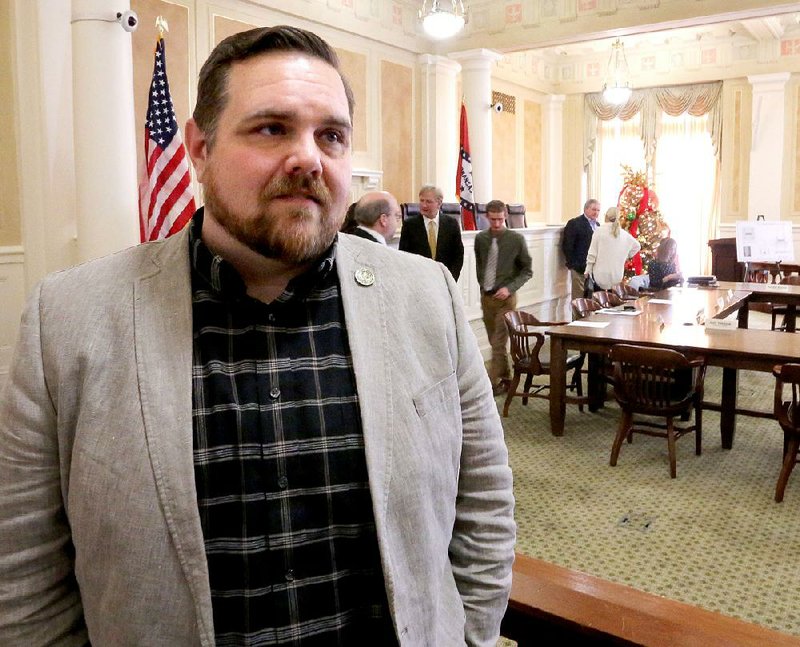A recent Arkansas Supreme Court decision reaffirming the state's immunity from lawsuits has the potential to be the most influential ruling from the high court in more than a decade, the leader of a legislative panel said Tuesday.
Rep. Bob Ballinger, R-Hindsville, convened the Litigation Reports Oversight Subcommittee on Tuesday to hear testimony from several parties about the Jan. 18 Supreme Court ruling in Board of Trustees of the University of Arkansas v. Matthew Andrews. In that decision, a 5-2 majority ruled that the Arkansas Constitution bars the Legislature from passing laws waiving sovereign immunity.
Kicking off the meeting, Ballinger said the Andrews decision might be the court's "biggest" since its 2002 landmark school funding decision in Lake View School District No. 25 v. Huckabee.
Ballinger also floated the idea of a constitutional fix to address the Andrews decision, though he fell short of endorsing a proposed amendment already submitted by one citizens group. The voters would have to approve amending the constitution, whether the proposal is by the Legislature or by initiative.
According to the Bureau of Legislative Research, Arkansas is one of three states to have absolute sovereign immunity enshrined in their constitutions.
The others are West Virginia and Alabama -- where courts have carved out exceptions to sovereign immunity over the years, according to the bureau.
In Arkansas, all monetary claims against the state will now have to go through the Arkansas Claims Commission, which is already dealing with a 30 percent increase in claims unrelated to the Andrews decision, Claims Commission Director Kathryn Irby told lawmakers. Before Andrews, some monetary claims were in lawsuits filed in state courts and some were filed with the commission.
The commission, which has five full-time staff members, including a single attorney, is on track to handle 1,100 cases in the fiscal year ending in June, Irby said. The commission hears cases and decides whether claims should be paid and how much. Legislators then review the decisions and decide whether to approve or amend the judgments made by the commission.
With her current staff, Irby said she will be able to handle the workload, but is having to ask lawmakers during the fiscal session next month to approve $250,000 in additional funds to pay the increased number of claims.
Irby said she had no prediction for how much work the court's decision would send her way, but a "significant" increase might cause her to request more workers.
Besides its impact on monetary claims against the state, Ballinger and other lawmakers who spoke up during Tuesday's two-hour meeting said they shared the concerns of the court's dissenting justices: that the decision could be applied to stifle suits over public records requests, discrimination claims and other illegal actions by state agencies.
In a rebuttal to those fears, Arkansas Solicitor General Lee Rudofsky of the state attorney general's office told the committee that the Supreme Court's opinion in Andrews had been "narrowly" worded and should still allow exceptions to sovereign immunity in the cases of illegal actions by the state.
"I kind of take issue with that," said Sen. Will Bond, D-Little Rock. "Narrowly meaning it applies to every law we've ever passed that granted ability to sue the state."
Rudofsky said that under the roughly 20 years of precedent preceding Andrews, in which the high court allowed lawmakers to waive immunity by passing laws, the Legislature only did so on a handful of occasions.
The two clear examples, Rudofsky said, are the state's whistle-blower and minimum wage laws, the latter of which was at the center of the Andrews decision.
Other laws, such as the Freedom of Information Act and the Administrative Procedure Act, are not monetary in nature, Rudofsky said. Under his interpretation of Andrews, state agencies and officials violating those laws could still be brought to court.
"I don't expect many state agencies will raise [sovereign immunity] with respect" to those laws, Rudofsky said, adding that he would not advise other state attorneys to make such claims.
But court records show that the attorney general's office, which Rudofsky represents, continued to raise sovereign immunity while seeking to dismiss a Freedom of Information Act lawsuit seeking records related to the state's execution drug supply.
Asked by a reporter about the claims of sovereign immunity in that case, a spokesman for the attorney general's office said in a statement: "The argument in our ... brief was that the decision to not disclose documents was consistent with FOIA and therefore not a violation of state law.
"In instances where there is a violation of state law, Andrews does not prevent a FOIA lawsuit, which is what the Solicitor General testified to today."
Attorneys for the University of Arkansas System, who argued the case against a bookstore manager seeking overtime wages in Andrews, also told lawmakers they would not use the new precedent in attempts to dismiss lawsuits over public records requests.
The university system also intends to fully comply with the Arkansas Minimum Wage Act, said attorneys David Curran and JoAnn Maxey, even though the court's opinion said the system could not be sued for back wages. The plaintiff, Michael Andrews, had claimed the system owed him overtime pay; the state said he should go through the Claims Commission.
Senate President Pro Tempore Jonathan Dismang, R- Searcy, also expressed concerns that Attorney General Leslie Rutledge -- who represents the state -- had filed an amicus brief supporting the university system while not asking for lawmakers' input.
"This case lessened our abilities. We lost some control as a Legislature," Dismang said.
Ballinger said any constitutional amendment to allow the Legislature to waive sovereign immunity would likely have to come from a public petition process.
That process would require more than 84,000 signatures to be obtained in order to get a proposed amendment on the ballot this November. So far, wording for one proposal has been submitted to the attorney general's office for approval.
A Section on 01/31/2018
